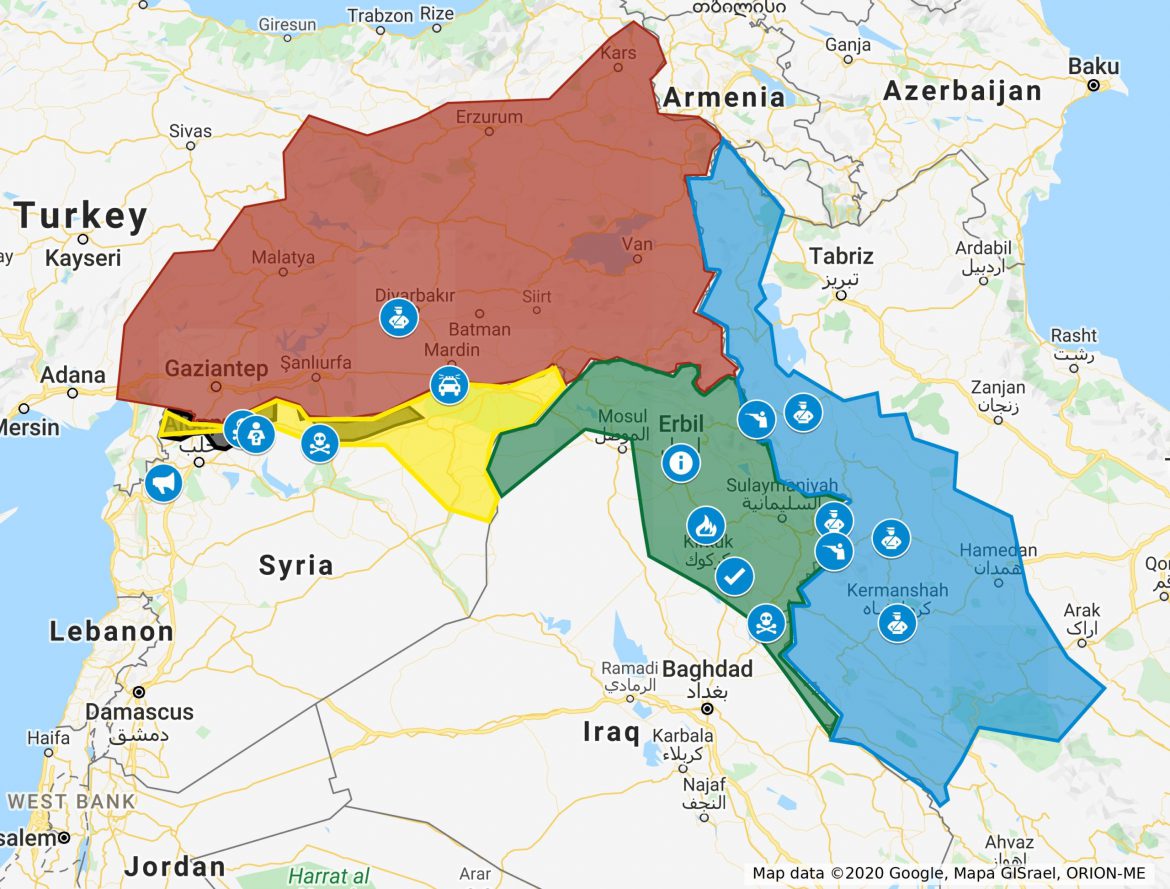1.1K
Iran
- The Iranian authorities continued their campaign of prosecution targeting Kurds following the November 2019 anti-government protests. In Kermanshah, an Islamic Revolutionary Court sentenced three Kurdish activists to prison for “membership of opposition parties” and “protesting and preparing against the national security.” Sobhat Omedi was sentenced to ten years in prison, Khali Assad received a six-year, six-month sentence, and Mehdai Abdali a one-year sentence. In Sanandaj, a criminal court sentenced Iskander Lutfi, an activist affiliated with a local teachers’ union, to two years in prison for “spreading propaganda against the Islamic Republic.” In Mehabad, the Kurdistan Human Rights Association (KMMK) reported that Hadi Tenomand was sentenced by an Islamic Revolutionary Court to three years and six months imprisonment for “membership of an organization that spreads propaganda.” Tenomand is originally from Bokan and was arrested alongside more than 50 members of a labor rights organization. Meanwhile, in Marivan, 26-year-old Pishtewan Afsari, who is from Nie village, was sentenced to nine years in prison for his participation in the November protests.
- Iranian border guards ambushed a group of Kurdish border porters (Kolbars) near Nowsud on Sunday, killing two and wounding seven. Also, on Sunday, Iranian authorities injured two more Kolbars near Piranshahr and Marivan. Since the beginning of 2020, the Iranian regime has killed four Kolbars and injured at least 26.
Iraq
- Iraq’s “Disputed Territories” remain plagued by insecurity and an increasing number of terrorist incidents since Iraqi forces and Iranian-backed militias squashed the Kurdish independence referendum on October 16, 2017. On February 13, ISIS (Da’esh) terrorists attacked a Kurdish village west of Khanaqin, most of whose residents belong to the Kakie religious group, killing one civilian and injuring at least seven. Da’esh then used an IED to attack an Iraqi Army convoy attempting to evacuate the wounded from the first attack. Additionally, near Tuz, Da’esh released two kidnapped Kurdish siblings after receiving a 70,000 USD ransom. Meanwhile, in Kirkuk city, a rocket attack hit the K1 base where many US personnel in Iraq are stationed on Thursday evening. Operation Inherent Resolve spokesman Colonel Miles Caggins confirmed the attack but announced there were “no casualties or damage to facilities.” Iranian-backed militias launched a similar attack in December 2019 that killed an American contractor and wounded several US military personnel.
- Prime Minister of Iraq designate Mohammed Tawfiq Allawi is set to announce his new cabinet this week. That said, while Kurdish officials stressed the importance of negotiations with Kurdish political parties regarding the selection of Kurdish ministers, it remains unclear what shape Kurdish participation in Allawi’s government will take, though multiple news reports claim Kurds will occupy three positions in Allawi’s cabinet. Meanwhile, the Speaker of the Council of the Representatives of Iraq, Mohammed al Halbousi, visited both Erbil and Sulaymaniyah to discuss the formation of the government in Baghdad. Sunnis and Kurds fear the new government will exclude them and Iraqi protestors continue to reject Allawi and refer to him as an Iran-backed candidate.
Syria
- Joint Russian-Turkish military patrols along the Syrian-Turkish border resumed on Monday after being suspended for two weeks. The joint patrols generally take place in the Kurdish region between al Darbasiya and Kobani yet were suspended over tensions between Russia and Turkey over Idlib. On another note, Turkish-backed jihadists attacked five villages northwest of Manbij, killing an elderly woman and wounding five Syrian regime personnel. Turkish proxies also launched indirect fire attacks on the towns of Tal Tamer and Ain Essa and continued attempting to seize control of surrounding villages.
- Syrian Democratic Forces (SDF) spokesperson Gabriel Kino denied SDF personnel were fighting alongside Syrian regime forces against Turkish-backed groups in Idlib. Kino, in response to previous rumors regarding the SDF in Idlib, said, “We in the leadership of the Syrian Democratic Forces confirm that this news is not true.” Concurrently, SDF General Commander Mazloum Abdi, in an interview with al Arabiya, stated, “There is no return to Syria before 2011, and there is no solution without the Kurds.” Abdi’s remarks follow a series of Syrian regime successes, which include seizing major areas in Idlib, further consolidating authority over Aleppo, and asserting control over the main highway that connects Damascus with Syria’s northern provinces.
- Thousands of people fleeing Idlib due to the Syrian regime bombardments have arrived in the SDF controlled areas especially in Manbij. The arrival of the displaced people come after the Kurdish led administration welcomed them in the region.
Turkey
- The Turkish government arrested hundreds of members of the pro-Kurdish Peoples’ Democratic Party (HDP) ahead of the party’s congress scheduled for February 23. On Friday, Turkish police launched simultaneous raids on Kurdish homes and arrested 20 people, including senior HDP members, in Diyarbakir Province’s Bağlar and Yenişehir districts. Additional arrests took place in Van, Dersim, Mardin, Urfa, Adana, Shirnak, Batman, and Ankara. HDP’s Law and Human Rights Commission spokesperson Ayshe Basharan responded to the recent arrests by saying, “Before the 4th Ordinary Congress of the HDP, efforts to criminalize our party through various excuses and to intimidate our citizens through political genocide operations, are ongoing.” The HDP also denounced the government’s arrest of the prominent Kurdish writer and politician Mahmut Aliak, who had previously been arrested by Turkish authorities eight times. The HDP then claimed, citing content released on social media, that Turkish police used excessive force against an elderly citizen and former HDP officials.

